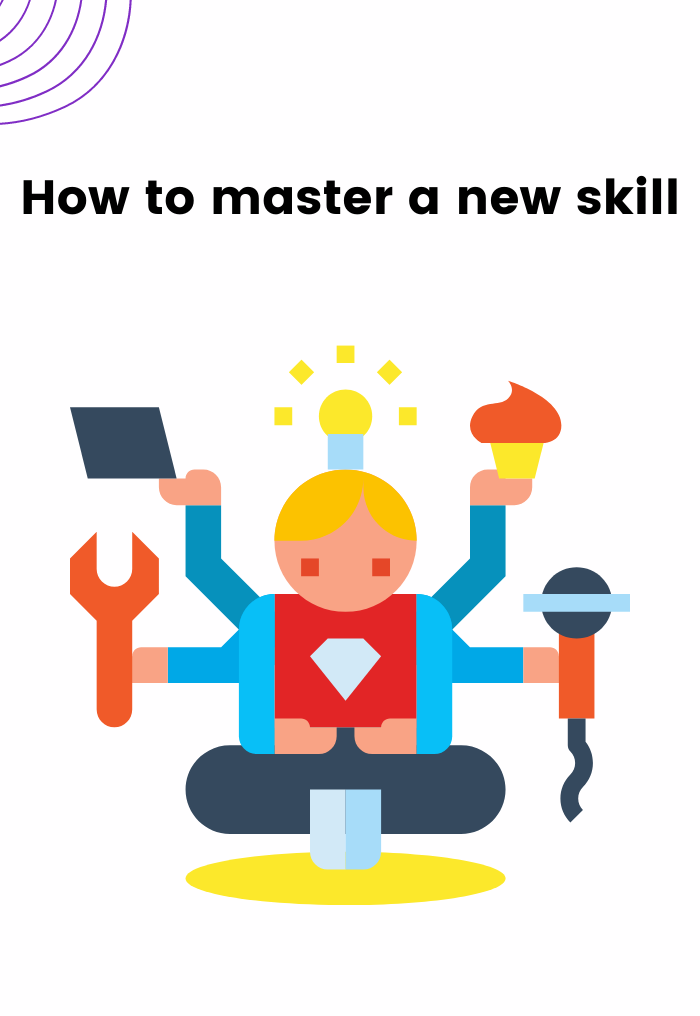How to master a new skill

Parent Post
Heidi Grant Halvorson
In a fast-moving, competitive world, being able to learn new skills is one of the keys to success. It’s not enough to be smart — you need to always be getting smarter.
Get the right help
Get the right help
Eliciting support from others can greatly increase learning. Find someone you trust who has mastered the skill you’re trying to attain. And look beyond your immediate manager.
If you can’t find a mentor inside your company, look for people in your industry or from your network. Ultimately, you want to go with the best teacher.
Reflect along the wayTo
Reflect along the way
To move from experimentation to mastery, you need to reflect on what you are learning. Always share your goals with those individuals who can provide informational or emotional support along the way.
Talking about your progress helps you get valuable feedback, keeps you accountable, and cements the change.
Be patientToo often, we
Be patient
Too often, we approach a new skill with the attitude that we should nail it right out of the gate. The reality is that it takes much longer.
It’s not going to happen overnight. It usually takes six months or more to develop a new skill, and it may take longer for others to see and appreciate it.
People around you will only notice 10% of every 100% change you make.
Make sure it’s neededMake
Make sure it’s needed
Make sure the skill is relevant to your career, organization, or both. You may be jazzed up about learninto speak in front of large audiences, but does your manager value that?
Gaining a new skill is an investment, and you need to know upfront what the return will be.
Unless you need the skill for your job or a future position, it’s unlikely you’ll get money for training or support from your manager.
Principles to Remember Do:
Principles to Remember
Do:
- Select a skill.
- Divide the skill up into smaller, manageable tasks.
- Reflect on what you’ve learned and what you still want to accomplish.
Don’t:
- Try to learn in a vacuum — ask others for guidance and feedback.
- Rely solely on your boss for advice — you may want to involve someone who isn’t responsible for evaluating you.
- Assume it’s going to happen overnight — it usually takes at least six months to develop a new skill.
Know how you learn
Know how you learn best
Some learn best by looking at graphics or reading. Others would rather watch demonstrations or listen to things being explained. Still, others need a “hands-on” experience.
Figure out your ideal learning style by looking back. Reflect on some of your past learning experiences, and make a list of good ones and another list of bad ones.
Identify common strands which determine the learning environment that works best for you.
Start small Self-improvement can
Start small
Self-improvement can feel overwhelming. You can’t take on everything. If you do, you’ll never do it. Instead, choose one or two skills to focus on at a time and break that skill down into manageable goals.
For example, if you’re trying to become more assertive, you might focus on speaking up more often in meetings by pushing yourself to talk within the first five minutes.
We all want to
We all want to be better at something. After all, self-improvement is necessary to get ahead at work.
But once you know what you want to be better at — be it public speaking, using social media, or analyzing data — how do you start?
Of course, learning techniques will vary depending on the person’s skill, but here are some general rules you can follow.
Check your readiness
Check your readiness
When working on a new skill or competency, you need to ask yourself two things:
First, is your goal attainable? There are certain limits to what you can learn. You may want to be a brain surgeon but not have the eye-hand coordination required.Second, how much time and energy can you give to the project? It’s not like going to the pharmacy and getting a prescription filled.
Recognize that learning a new skill takes extreme commitment. Unless your goal is attainable and you’re prepared to work hard, you won’t get very far.
Challenge yourself to teach
Challenge yourself to teach it to others
One of the quickest ways to learn something new, and to practice it, is to teach others how to do it. So share what you learn with your team or manager. You can force yourself to do it by putting a “teaching” date on your calendar or agreeing to lead a formal training session a few months down the road.
With objectives like those, your learning will be much more focused and practical.

